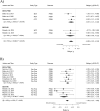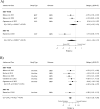A systematic review and meta-analysis on the efficacy of dialectical behavior therapy variants for the treatment of post-traumatic stress disorder
- PMID: 39351658
- PMCID: PMC11445934
- DOI: 10.1080/20008066.2024.2406662
A systematic review and meta-analysis on the efficacy of dialectical behavior therapy variants for the treatment of post-traumatic stress disorder
Abstract
Background: While there are well-established treatments for post-traumatic stress disorder (PTSD), these interventions appear to be less effective for individuals with comorbid borderline personality disorder (BPD) symptoms. Dialectical Behavior Therapy (DBT) for PTSD and DBT Prolonged Exposure (PE) are both effective interventions for treating these patients, but a comprehensive analysis evaluating the efficacy of these two interventions is lacking.Objective: To determine the effect sizes of PTSD-specific DBT treatments.Methods: We conducted a systematic review and pre-registered meta-analysis of the DBT literature for treating PTSD (osf.io/62rfq). Eligible trials and treatment evaluations published before September 2023 were searched in SCOPUS, PubMed, and the Cochrane Library databases. Thirteen articles were identified, and data were extracted for primary (PTSD symptoms) and secondary outcomes (BPD, depression, dissociation, non-suicidal self-injury [NSSI]). Treatment effects were calculated for randomised controlled trials, controlled clinical trials, and pre-post evaluations.Results: Overall, the studies involved 663 participants. Compared with control groups, PTSD-specific DBT treatments showed moderate effects in reducing PTSD symptom severity g = -0.69 (95% CI -1.03 to -0.34, p < .001) and depression g = -0.62 (95% CI -1.13 to -0.12, p = .016). Moreover, the pre-post changes showed an overall effect size for dissociative symptoms of g = -0.72 (95% CI -1.05 to -0.40, p < .001), for BPD-associated symptoms of g = -0.82 (95% CI -1.06 to -0.59, p < .001), and for NSSI frequency (g = -0.70, 95% CI -1.12 to -0.28, p = .001).Conclusions: Based on the results of our meta-analysis, DBT-PTSD and DBT PE were effective in reducing PTSD symptom severity and comorbid depressive symptoms. Further research on stage-based treatments should focus on systematically assessing NSSI, BPD symptoms, and suicidality.
Antecedentes: Aunque existen tratamientos bien establecidos para el trastorno de estrés postraumático (TEPT), estas intervenciones parecen ser menos efectivas para individuos con síntomas comórbidos de trastorno límite de la personalidad (TLP). La terapia dialéctica conductual (DBT por sus siglas en ingles) para el TEPT y la DBT con exposición prolongada (EP) son intervenciones efectivas para tratar a estos pacientes, pero falta un análisis exhaustivo que evalúe la eficacia de estas dos intervenciones.
Objetivo: Determinar el tamaño del efecto de los tratamientos de DBT específicos para el TEPT.
Método: Realizamos una revisión sistemática y metaanálisis pre-registrado de la literatura sobre DBT para el tratamiento del TEPT (osf.io/62rfq). Los ensayos y evaluaciones de tratamiento elegibles publicados antes de septiembre de 2023 se buscaron en las bases de datos SCOPUS, PubMed y Cochrane Library. Se identificaron trece artículos y se extrajeron datos para los resultados primarios (síntomas de TEPT) y secundarios (TLP, depresión, disociación, autolesiones no suicidas [NSSI, por sus siglas en inglés]). Los efectos del tratamiento se calcularon para ensayos controlados aleatorizados, ensayos clínicos controlados y evaluaciones pre-post.
Resultados: En general, los estudios incluyeron a 663 participantes. En comparación con los grupos de control, los tratamientos de DBT específicos para el TEPT mostraron efectos moderados en la reducción de la gravedad de los síntomas del TEPT, con un g = −0,69 (IC 95% −1,03 a −0,34, p < 0,001) y de la depresión, con un g = −0,62 (IC 95% −1,13 a −0,12, p = 0,016). Además, los cambios pre-post mostraron un tamaño del efecto general para los síntomas disociativos de g = −0,72 (IC 95% −1,05 a −0,40, p < 0,001), para los síntomas asociados al TLP un g = −0,82 (IC 95% −1,06 a −0,59, p < 0,001), y para la frecuencia de NSSI (g = −0,70, IC 95% −1,12 a −0,28, p = 0,001).
Conclusión: Según los resultados de nuestro metaanálisis, la DBT-TEPT y la DBT EP fueron efectivas para reducir la gravedad de los síntomas de TEPT y los síntomas depresivos comórbidos. Futuras investigaciones sobre tratamientos basados en etapas deberían centrarse en evaluar de forma sistemática la NSSI, los síntomas del TLP y la suicidalidad.
Keywords: DBT PE; DBT-EP; DBT-PTSD; DBT-TEPT; Post-traumatic stress disorder; Trastorno de estrés postraumático; borderline personality disorder; depresión; depression; dialectical behavior therapy; exposición prolongada; meta-analysis; metaanálisis; prolonged exposure; terapia dialéctica conductual; trastorno límite de la personalidad.
Plain language summary
We conducted the first meta-analysis assessing the efficacy of Dialectical Behavior Therapy for PTSD (DBT-PTSD) and Dialectical Behavior Therapy Prolonged Exposure (DBT PE) for individuals with comorbid PTSD and BPD symptoms.Based on RCTs/CCTs, we found moderately beneficial effects on PTSD symptoms, and depression for both stage-based interventions and large effects on non-suicidal self-injury frequency for DBT PE.DBT-PTSD and DBT PE resulted in pre-post improvements in dissociative symptoms, BPD-associated symptoms, and non-suicidal self-injury frequency.
Conflict of interest statement
PLP is an advisor for Behringer-Ingelheim. He received speaker honoraria from Janssen, GSK, infectopharm and Oral-B. He receives royalties from Hogrefe Publishers.
Figures



References
-
- American Psychiatric Association . (2013). Diagnostic and statistical manual of mental disorders: DSM-5 (5th ed.). American Psychiatric Publishing.
-
- Bagley, J. M. (2022). Book review: Treating trauma in dialectical behavior therapy: The DBT prolonged exposure protocol (DBT PE). Journal of Contemporary Psychotherapy, 52(4), 355–356. 10.1007/s10879-022-09548-5 - DOI
-
- Barnicot, K., & Crawford, M. (2019). Dialectical behaviour therapy v. mentalisation-based therapy for borderline personality disorder. - PubMed
Publication types
MeSH terms
Grants and funding
LinkOut - more resources
Full Text Sources
Other Literature Sources
Medical
